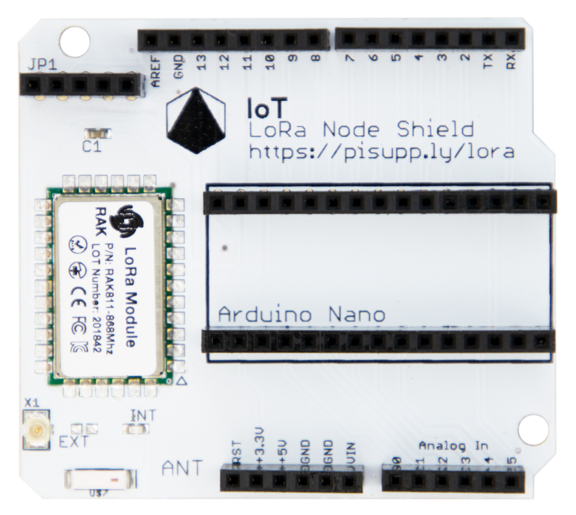
IoTLoRaRange
Repository for all of the IoT LoRa Range of Products. This project was originally funded on Kickstarter and purchases can be made through Pi-Supply.com and their distributers.
This repository is for the documentation for the IoT LoRa Range of products. The code for these products are linked in each folder.
Product Range
We want to bring LoRa technology to the masses and allow anyone to get started with the LoRa network in an easy and cost effective way by using the Raspberry Pi, micro:bit, Arduino, and other low cost single board computers.
Our IoT LoRa range allows you to do this by reducing the price of the hardware considerably and reducing setup time to minutes rather than hours.
LoRa Gateways
This is the piece of hardware in a LoRaWAN Network which is setup to primarily receive packets from LoRa Nodes and bridge them to a LoRaWAN Network such as The Things Network. These are usually able to receive from hundreds of nodes at the same time and provide LoRaWAN coverage for both your devices and others within range of it. This is most similar to your Wi-Fi Router in a home network.
IoT LoRa Gateway HAT

Our IoT LoRa Gateway HAT allows you to create an inexpensive LoRa gateway, compatible with The Things Network, in conjunction with a Raspberry Pi or other single board computers. The HAT allows you to set up your IoT LoRa gateway in minutes rather than hours for a third of the price of traditional gateways.
The IoT LoRa Gateway HAT utilises the RAKWireless RAK833 mPCIe LoRa gateway concentrator module which is based on Semtech SX1301 LoRa technology and provides a fully LoRaWAN Compliant gateway listening on 8 channels at the same time.
Our LoRa Gateway HAT Designed to allow you to make a DIY LoRa Gateway at a great budget with the Raspberry Pi or other compatible SBC. https://uk.pi-supply.com/products/iot-lora-gateway-hat-for-raspberry-pi
IoT LoRa Smart Gateway
Coming Soon...
LoRa Nodes
This is the terminology for either a complete sensor or the transmitter add-on such as our IoT LoRa pHAT or Micro:bit LoRa Node. These transmit small packets of data and are designed to be picked up by a LoRa Gateway.
IoT LoRa Raspberry Pi Node pHAT

Our IoT LoRa Node pHAT allows you to create an inexpensive LoRa node, compatible with The Things Network, in conjunction with a Raspberry Pi or other single board computers. This pHAT allows quicker prototyping as it has the LoRa stack on the chip. Add sensors, buttons and more to complete your LoRa network!
The board can be configured to use either of the two different frequencies listed below:
- 868 MHz
- 915 MHz
Our LoRa Node designed for use with Raspberry Pi Compatible with Python https://uk.pi-supply.com/products/iot-lora-node-phat-for-raspberry-pi
IoT LoRa Arduino Shield

Our IoT LoRa Node Shield allows you to create an inexpensive LoRa node, compatible with The Things Network, in conjunction with an Arduino. This board allows quicker prototyping as it has the LoRa stack on the chip. Add sensors, buttons and more to complete your LoRa network! The IoT LoRa Node Shield uses the RAKWireless RAK811 LoRa node module which is based on Semtech SX1276 LoRa technology.
The board can be configured to use either of the two different frequencies listed below:
- 868 MHz
- 915 MHz
Our LoRa Node designed for use with Arduino https://uk.pi-supply.com/products/iot-lora-node-shield
IoT LoRa micro:bit Node

Our IoT micro:bit LoRa Node allows you to create an inexpensive LoRa node, compatible with The Things Network, in conjunction with a BBC micro:bit or other single board computers. This board allows quicker prototyping as it has the LoRa stack on the chip. Add sensors, buttons and more to complete your LoRa network!
The IoT micro:bit LoRa Node uses the RAKWireless RAK811 LoRa node module which is based on Semtech SX1276 LoRa technology.
The board can be configured to use either of the two different frequencies listed below:
- 868 MHz
- 915 MHz
Our LoRa Node designed for use with the micro:bit Compatible with Microsoft Makecode https://uk.pi-supply.com/products/iot-micro-bit-lora-node
Reviews and Links
- Hackster.io Review - Hands-on with the New PiSupply LoRa Gateway and The Things Network
- CNX Software Overview - Pi Supply IoT LoRa Boards are made for Raspberry Pi & BBC Micro:bit Boards (Crowdfunding)
Projects
Coming soon!
LoRa Alliance Member

Pi Supply is a proud member of the LoRa Alliance. The LoRa Alliance is an open, non-profit association of members that are actively developing and deploying IoT solutions. Alliance members will collaborate to drive the global success of the LoRaWAN protocol, by sharing knowledge and experience to guarantee interoperability between operators in one open global standard.